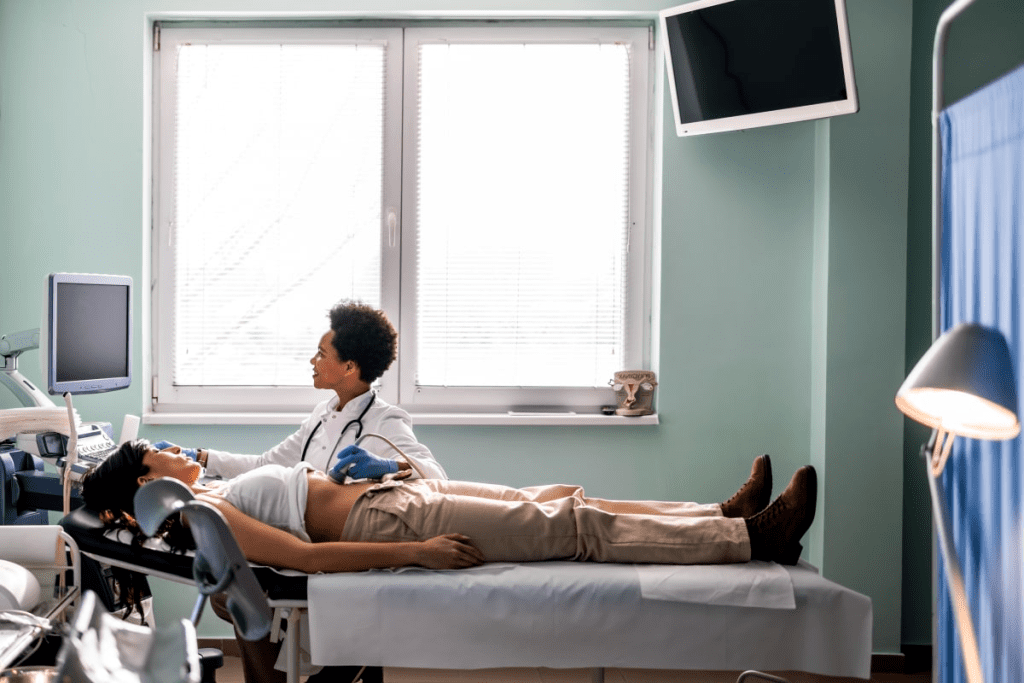Last Updated on November 24, 2025 by

Seeing a urologists for the first time can feel scary. But knowing what to expect can make you feel better. We’re here to help you understand what will happen during your first visit.
A urologist is a doctor who deals with the urinary and reproductive systems. This includes both adults and kids. Your first visit will include a full review of your health, a look at your symptoms, and a physical check-up.
Getting ready for your visit by bringing your medical records can help a lot. It makes sure you get the best care possible.
Urology covers many medical conditions. Knowing this can help patients see the value of urologists’ care. Urology deals with the urinary system in both men and women, and the male reproductive system.

Urologists are doctors who focus on the kidneys, bladder, prostate, and male reproductive organs. They help with many urological issues, like kidney stones, urinary incontinence, erectile dysfunction, and urinary tract cancers. If you have symptoms like painful urination or frequent UTIs, you might need a urologist.
About 90% of new urology patients don’t need surgery right away. This shows urologists often treat with diagnosis and medicine.
Urologists handle many issues, including urinary tract infections, kidney disease, and male infertility. They also do surgeries like sling procedures and vasectomies. Knowing what a urologist does can make it easier to get help for sensitive issues.
By focusing on urological health, people can stay well. Regular visits to a urologist can catch problems early. This can lead to better treatment results.
Getting ready for your first urologist visit is key to a smooth experience. Knowing what to bring and what to expect makes your visit more efficient.
It’s important to collect important medical information before you go. Make a list of all your medications and supplements. Also, note any symptoms you’ve been feeling. This helps your urologist understand your situation better.
Do some research on your urologist and write down questions. Ask about your condition, treatment options, and what to expect during the exam. Here are some examples:
On the day of your visit, remember to bring:
Being well-prepared makes your first visit to a prostate doctor or urologist better. Knowing what to expect and having all the necessary information helps you get the most out of your appointment.
When you first see a urologist, they start a detailed process to understand your health. This is key for diagnosing and treating issues with your urinary tract and reproductive system.
The first step is reviewing your medical history and symptoms. You’ll also talk about possible treatments. It’s important to communicate well with your urologist for the best care.
Your urologist will start by reviewing your medical history. They’ll ask about past health issues, surgeries, and medications. This helps them understand your health and find the cause of your symptoms.
Next, your urologist will ask about your symptoms. They want to know when they started, how bad they are, and what makes them better or worse. Being specific about your symptoms helps your urologist diagnose you accurately.
After understanding your history and symptoms, your urologist will talk about treatments. This could be lifestyle changes, medication, or surgery. Your urologist will help create a treatment plan that fits your needs and goals.
It’s important to ask questions and share any concerns during this talk. Your urologist is there to guide and support you.

When you first see a urologist, a thorough physical exam is part of the process. We know it might make you nervous. So, we want to tell you what to expect.
The exam’s details depend on your symptoms and health history. Men might get a digital rectal exam to check the prostate. Women could have a pelvic exam to look at the reproductive organs. We do these exams with care and respect for your comfort.
Nearly 90% of new urology patients don’t need invasive tests at their first visit. We aim to make your experience as smooth as possible.
We might order tests to help find what’s wrong. These include urinalysis to check your urine, blood tests for your health, and imaging exams like ultrasound or CT scans to see your urinary tract.
We aim to find the cause of your symptoms quickly. This lets us talk about possible treatments with you.
Knowing about these tests helps you get ready for your visit and any treatment that might follow.
Patients are happy with their urologist visits when certain things are done well. Healthcare providers need to focus on these key areas. Research shows what makes patients satisfied and improves their overall experience.
Efficiency and clinical expertise are very important. Studies found that 68% of patients want a urologist who is both skilled and quick. They want to be treated well and not kept waiting too long.
A prostate doctor or urologist needs to be very knowledgeable. They should know the latest medical news and use this to help patients. Being efficient means being both quick and thorough without wasting time.
Almost 49.6% of patients want a correct diagnosis and the right treatment. This means the urologist needs to be skilled and understand the patient’s worries. For example, when talking about how a urologist examines your ejaculation, patients want clear and kind explanations.
Good communication is key. Patients like it when their urologist explains things in simple terms. A comfortable and respectful place also makes a big difference. It helps patients feel more relaxed during sensitive exams or talks.
In short, patients look for efficiency, skill, accurate care, and clear talk during their visits to urologists. By focusing on these, healthcare providers can make patients happier and give better care.
When you first see a urologist, they will look at your medical history and check your symptoms. They will also do a physical exam. Urologists are important for diagnosing and treating problems with the urinary and reproductive systems. This includes procedures like a vasectomy for men.
Knowing what urology is can make you feel better. Urology is a part of medicine that focuses on urinary and reproductive system issues. It helps both men and women, and men’s reproductive health.
Learning about your first visit to a urologist can make you feel more ready. It’s important to talk openly and feel comfortable. This way, you can make the best choices for your care.
A urologist is a doctor who focuses on the urinary tract and male reproductive system. They treat issues like kidney stones, prostate problems, and erectile dysfunction.
Urology is the study and treatment of urinary tract and male reproductive system disorders. Urologists handle conditions like urinary infections, kidney stones, and prostate cancer.
A urologist might look at ejaculation for conditions like premature or retrograde ejaculation. They do this through physical exams, reviewing medical history, and running tests.
A common procedure is a vasectomy, which is a form of male sterilization. It involves cutting or blocking the vas deferens, the tubes that carry sperm.
Bring any medical records, test results, and medication lists to your first appointment. Also, write down your symptoms and questions for the urologist.
To prepare, gather your medical information and make a list of questions. Knowing what to expect can make your visit more productive and less stressful.
Expect a thorough check of your urinary tract and male reproductive system during a physical exam. This may include a digital rectal exam and other tests.
Tests like urinalysis, ultrasound, or CT scans might be done during your visit. These help evaluate your urinary and reproductive systems.
Clear communication is key to understanding your diagnosis and treatment options. It also helps build a positive relationship with your urologist.
Subscribe to our e-newsletter to stay informed about the latest innovations in the world of health and exclusive offers!